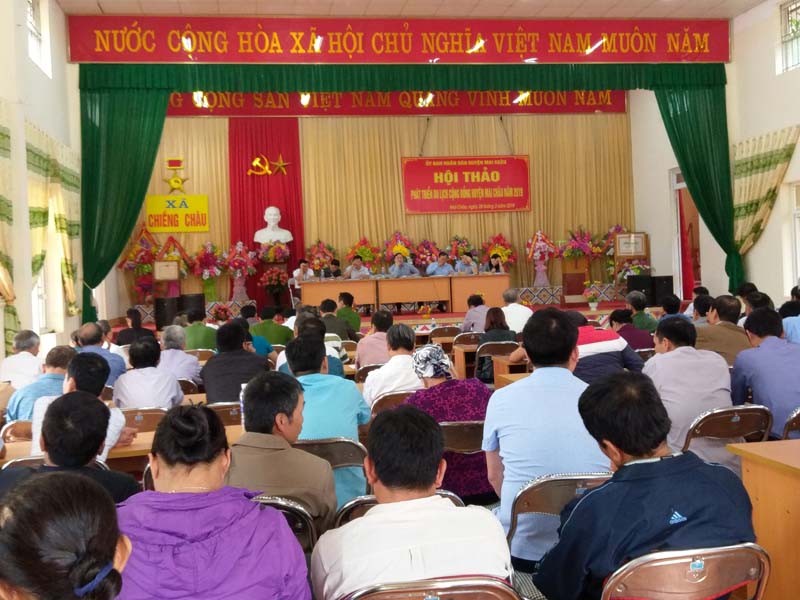
(HBO) - The People’s Committee of Mai Chau district on March 28 held a seminar on the development of community-based tourism in the district in 2019.
According to a report
on Mai Chau district’s tourism, as of the end of 2018, the district had 139 tourist
accommodation establishments, including 10 hotels, 26 hostels and 103 community
hostels. The district has seven community-based tourism sites. Last year, it
served 332,000 tourists, earning 107.57 billion VND (4.64 million USD) in
revenue.

An overview of the workshop.
At the workshop, participants exchanged opinions on several difficulties the district is facing in developing community-based tourism. They also approved a set of regulations
on managing tourism activities in Mai Chau with four chapters and 27 articles.
A leader of Mai Chau
district’s People’s Committee asked for the early establishment of a tourism
management board in Chieng Chau and Na Phon communes and Mai Chau town, the
organisation of training courses for households doing homestay tourism, the
registration of operating electric cars, and standardization of electric car
driver licenses.
Attention should be
paid to building a roadmap for the use of electric cars, considering the
building of a welcome gate at Tong Dau T-junction and car parks, particularly
those for electric cars, and intensifying dissemination of the regulations on tourism
activities for tourism households.
With its pristine landscapes, unique cultural heritage of Muong ethnic minority, and an expanding range of visitor experiences, Tan Lac district of Hoa Binh has fast become a captivating destination for both domestic and international tourists.
Until now, Sung village in Cao Son commune, Da Bac district remains the only Dao ethnic community in Hoa Binh province to develop a community-based tourism model. Beyond its untouched natural landscapes, cultural identity serves as the cornerstone attraction for visitors.
Alongside the diverse cultural identities of the Kinh, Muong, Tay, Thai, Dao, and Mong ethnic people, Hoa Binh province is also renowned as the "capital" of the northwestern Vietnamese cuisine, offering unique and distinctive dishes. At festivals, during Lunar New Year (Tet), or on significant family or community occasions, special dishes are prepared, leaving a lasting impression on visitors.
A Phong Linh (Yellow Tabebuia) flower garden in Thang village, Thach Yen commune, Cao Phong district is currently in full bloom, drawing a large number of visitors.
Community-based tourism has been thriving in Pa Co commune, Mai Chau district thanks to advantages in natural landscape and cultural identity.
Doan Ket commune of Yen Thuy district has recently held a ceremony to receive a certificate recognising Ta communal house as a provincial-level historical and cultural relic site.



